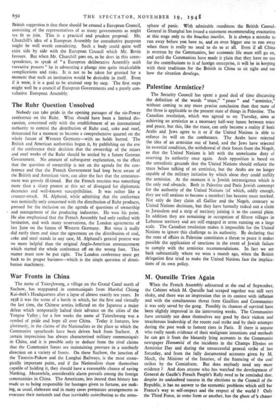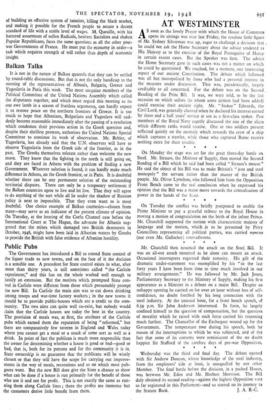M. Queuille Tries Again
When the French Assembly adjourned at the end of September, the Cabinet which M. Queuille had scraped together was still very shaky, and there was an impression that in its contest with inflation and with the simultaneous threat from Gaullists and Communists it was only saved by the gong. Possibly its chances of survival have been slightly improved in the intervening weeks. The Communists have certainly not done themselves any good by their violent and treacherous leadership of the recent coal strike and by their attempts during the past week to foment riots in Paris. If there is anyone who really needs evidence of their malignant intentions and methods he can get it from the blatantly lying accounts in the Communist newspaper Humanite of the incidents in the Champs Elysies on Armistice Day and during the unsuccessful general strike of last Saturday, and from the fully documented accounts given by M. Moch, the Minister of the Interior, of the financing of the coal strikes by the Cominform. But does anybody need any more evidence ? And does anyone who has watched the development of General de Gaulle's French People's Rally need to be reminded that, despite its undoubted success in the elections to the Council of the Republic, it has no answer to the economic problems which still bar France's way to self-respect and the respect of the world ? Only the Third Force, in some form or another, has the ghost of a chance of building an effective system of taxation, killing the black market, and making it possible for the French people to secure a decent standard of life with a stable level of wages. M. Queuille, with his battered assortment of sullen Radicals, hesitant Socialists and shaken Popular Republicans, faces the same questions as all the other post- war Governments of France. He must put the economy in order—a task which requires strength of will rather than depth of economic insight.



































 Previous page
Previous page